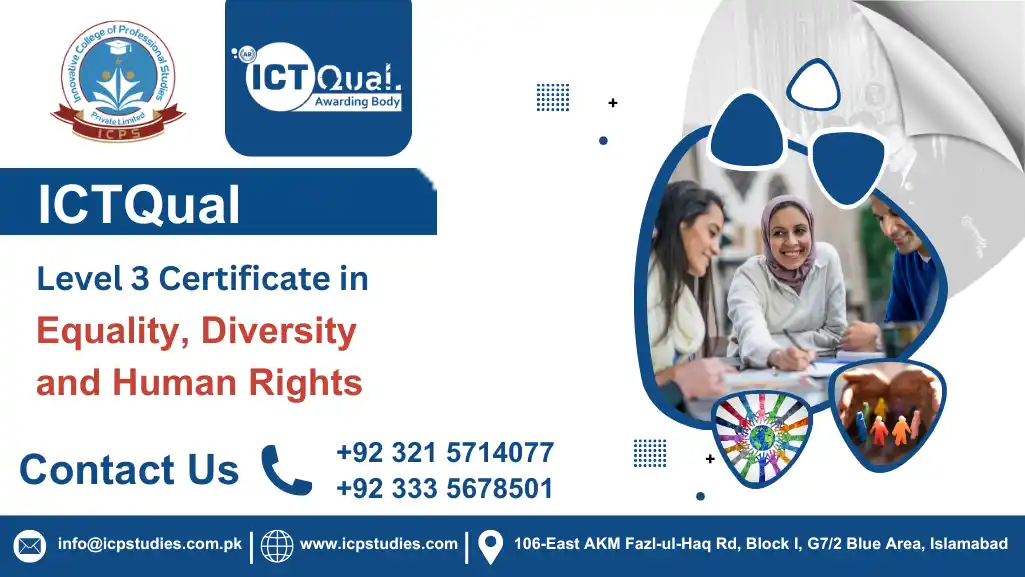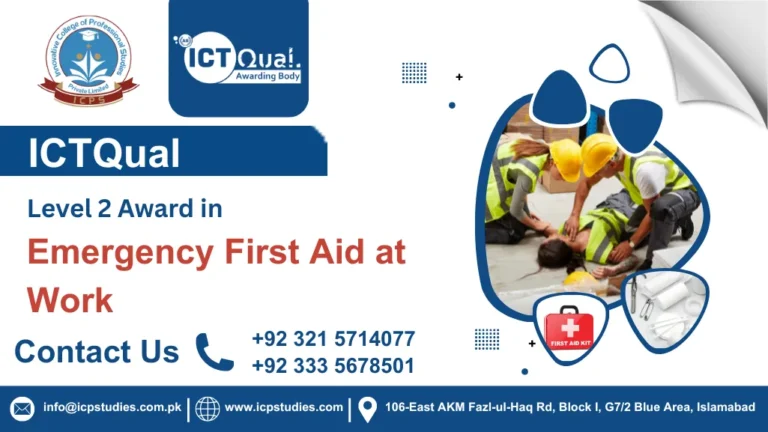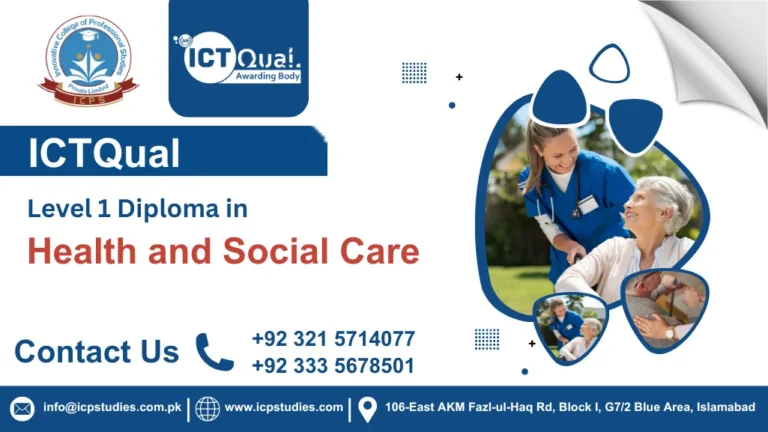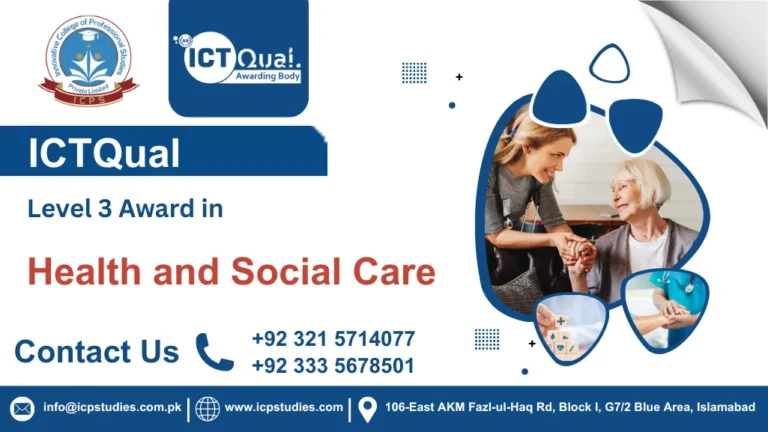The ICTQual Level 3 Certificate in Equality, Diversity and Human Rights is a nationally recognised qualification that provides in-depth knowledge of the principles, legislation, and practical applications of promoting fairness, respect, and inclusion. It is designed for individuals seeking to strengthen their understanding of equality law, diversity awareness, and the protection of human rights in both professional and community contexts. Creating an inclusive society starts with strong leadership and well-informed policies. The ICTQual Level 3 Certificate in Equality, Diversity, and Human Rights provides advanced knowledge on how organisations and individuals can embed diversity into everyday practices. it equips participants with the skills to embed equality and human rights principles into everyday practice.
This qualification develops a comprehensive understanding of the legislative frameworks and ethical responsibilities that underpin equality, diversity, and human rights. Learners will explore the UK Equality Act, relevant human rights conventions, and practical strategies for challenging discrimination and fostering inclusive environments. The programme is suitable for professionals in leadership, human resources, education, public services, social care, and the voluntary sector. Delivered through a combination of structured learning and practical application, This course is designed for professionals in management roles, HR specialists, and those responsible for developing workplace diversity policies. It covers topics such as inclusive leadership, equal pay regulations, and preventing workplace discrimination.
The ICTQual Level 3 Certificate in Equality, Diversity and Human Rights combines academic rigour with practical relevance. Delivered by industry experts and aligned with UK legal and ethical standards, it empowers learners to become advocates for fairness and inclusion. The qualification is widely recognised by employers and professional bodies, enhancing both career prospects and personal development. Successful candidates may progress to higher-level qualifications in leadership, social care, education, or human resource management. The skills and knowledge gained can also support career advancement in roles that demand a strong commitment to equality, diversity, and ethical governance. By completing this qualification, learners will be equipped to lead diversity initiatives at an organisational level.
All About ICTQual Level 3 Certificate in Equality, Diversity and Human Rights
Course Overview
The ICTQual Level 3 Certificate in Equality, Diversity and Human Rights is a recognised qualification designed to equip learners with the knowledge and skills to promote fairness, inclusion, and respect in professional and community environments. This course explores the fundamental principles of equality and diversity, the UK legal framework, and the global context of human rights. It is ideal for individuals aiming to make a positive impact by challenging discrimination and fostering inclusive practices.
Learners will gain an in-depth understanding of the Equality Act, key human rights legislation, and ethical responsibilities that apply across a range of sectors. Through practical case studies and real-world applications, the course provides the tools needed to address inequality, prevent discrimination, and embed inclusive values into workplace culture.
Suitable for professionals in human resources, education, healthcare, social care, and public services, this programme combines theoretical knowledge with actionable strategies. It supports compliance with legal requirements while strengthening professional credibility and social responsibility.
On completion, participants will be equipped to influence positive change, contribute to inclusive policy development, and enhance the ethical standards within their organisation. The qualification also provides a strong foundation for progression to advanced study or leadership roles in equality, diversity, and human rights advocacy.
Study Units
- Theories and Concepts in Equality and Diversity
- The Role of Human Rights in Social Justice and Inclusion
- Managing Equality and Diversity in Professional Settings
- Advanced Strategies for Addressing Bias and Discrimination
- Leadership and Policy Development for Inclusive Organisations
- Equality Impact Assessments and Data-Driven Inclusion Strategies
- Crisis Management and Addressing Discrimination in the Workplace
To enrol in the ICTQual Level 3 Certificate in Equality, Diversity and Human Rights, applicants should meet the following entry requirements:
- Minimum Age: Learners must be at least 16 years old at the time of enrolment.
- Educational Background: A basic secondary school education or equivalent qualification is recommended.
- Work Experience: No prior work experience is required; however, experience in a related field may be beneficial.
- Language Proficiency: Learners must have a good command of the English language, both written and verbal, to successfully complete the course assessments.
This qualification is designed for individuals who are committed to promoting fairness, inclusion, and respect in both professional and community settings. It is particularly suited for:
- Professionals in human resources, management, and leadership roles who wish to strengthen workplace diversity policies.
- Educators, trainers, and academic staff seeking to embed inclusive practices within educational environments.
- Healthcare and social care workers aiming to provide equitable and culturally sensitive services.
- Public sector employees and community workers involved in policy-making, advocacy, or equality initiatives.
- Individuals aspiring to work in human rights organisations or advocacy roles.
By completing this course, learners will be well-prepared to influence positive change and uphold the principles of equality, diversity, and human rights in their chosen field.
Learning Outcomes
Theories and Concepts in Equality and Diversity
- Understand the key theoretical frameworks underpinning equality and diversity.
- Analyse the historical and social factors influencing inclusion practices.
- Apply core concepts to real-world workplace and community scenarios.
The Role of Human Rights in Social Justice and Inclusion
- Explain the relationship between human rights, equality, and social justice.
- Evaluate international and UK human rights legislation.
- Integrate human rights principles into equality and diversity initiatives.
Managing Equality and Diversity in Professional Settings
- Implement effective equality and diversity policies within organisations.
- Identify barriers to inclusion and develop solutions to overcome them.
- Promote cultural awareness and respect among colleagues and stakeholders.
Advanced Strategies for Addressing Bias and Discrimination
- Recognise different forms of bias and discrimination in professional contexts.
- Apply evidence-based strategies to address and reduce discrimination.
- Develop interventions that promote long-term inclusive behaviour.
Leadership and Policy Development for Inclusive Organisations
- Lead equality and diversity initiatives with confidence and authority.
- Create inclusive policies that align with organisational goals and legal standards.
- Foster an environment of respect, collaboration, and fairness.
Equality Impact Assessments and Data-Driven Inclusion Strategies
- Conduct equality impact assessments to measure inclusivity.
- Use data to identify gaps and develop targeted inclusion strategies.
- Monitor and evaluate the effectiveness of diversity initiatives.
Crisis Management and Addressing Discrimination in the Workplace
- Respond effectively to incidents of discrimination and inequality.
- Implement crisis management strategies that protect employees and organisational integrity.
- Review and improve policies to prevent recurrence of discriminatory practices.
FAQs ICTQual Level 3 Certificate in Equality, Diversity and Human Rights







